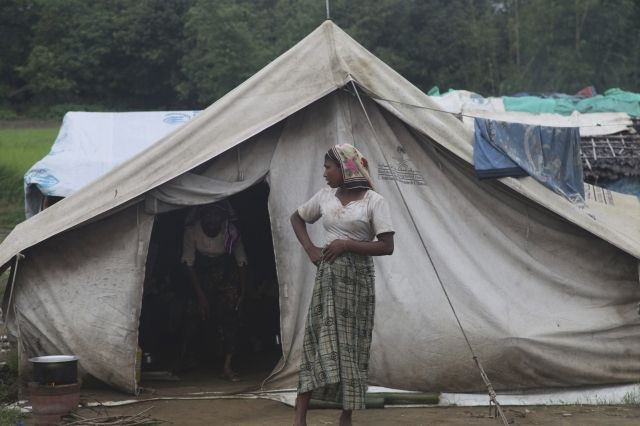Myanmar’s President Admits Unprecedented Violence; 22,000 Forced To Flee Homes

More than 22,000 people — most from Muslim communities — have been rendered homeless in western Myanmar, the U.N. said Sunday even as President Thein Sein admitted that an unprecedented wave of sectarian violence has targeted the nation’s Rohingya Muslims, destroying several villages and townships.
The U.N. statement and the president’s acknowledgment followed the release of satellite images showing more than 800 buildings and houseboats burned to the ground in Kyaukpyu, in western Rakhine state.
Officials said 64 people have died in the fresh unrest that began last Sunday but Human Rights Watch, which released the images, said it fears the figure could be much higher.
The U.N. chief in Yangon, Ashok Nigam, citing government estimates furnished early Sunday, said 22,587 people — 21,700 among them Muslims — had been forced to abandon their houses as 4,665 houses were torched in the recent violence.
"These are people whose houses have been burnt, they are still in the same locality," he told AFP, indicating that thousands more who had fled in boats towards the state capital Sittwe may not be included in that estimate.
A U.N. independent expert has called for the underlying causes of the tension and conflict between the Buddhist and Muslim communities in Myanmar's Rakhine state to be addressed as a priority.
“Buddhist and Muslim communities continue to suffer from the violence in Rakhine State, so it is imperative that the government pursues a policy of integration and long-term reconciliation between the two communities,” the special rapporteur on the human rights situation in Myanmar, Tomas Ojea Quintana, said while presenting a report on his work to the U.N. General Assembly Thursday. “This will necessarily involve addressing the underlying causes of the tensions, which includes the endemic discrimination against the Rohingya community.”
The fresh wave of violence, which began in Minbyar and Mrauk-U districts, both located north of the regional capital, Sittwe, is the worst in the region since the beginning of the unrest in June.
The Myanmar government declared a state of emergency in Rakhine State June 10, a week after the outbreak of communal sectarian violence. Remote Rakhine is an area known for incidents of sectarian violence between the Buddhist residents and the Muslim minority.
The violence subsided two weeks after the declaration of emergency, during which at least 78 people were killed and thousands of homes belonging to both communities were torched, according to a report by Myanmar's National Human Rights Commission published July 11. Unofficial estimates of casualties exceeded 100, Amnesty said.
Buddhists comprise 89 percent of Myanmar's population while Muslims represent 4 percent. The Muslim minority consists of the Rohingya people and the descendants of Muslim immigrants from neighboring India, Bangladesh, China and early Arab and Persian settlers.
© Copyright IBTimes 2025. All rights reserved.






















